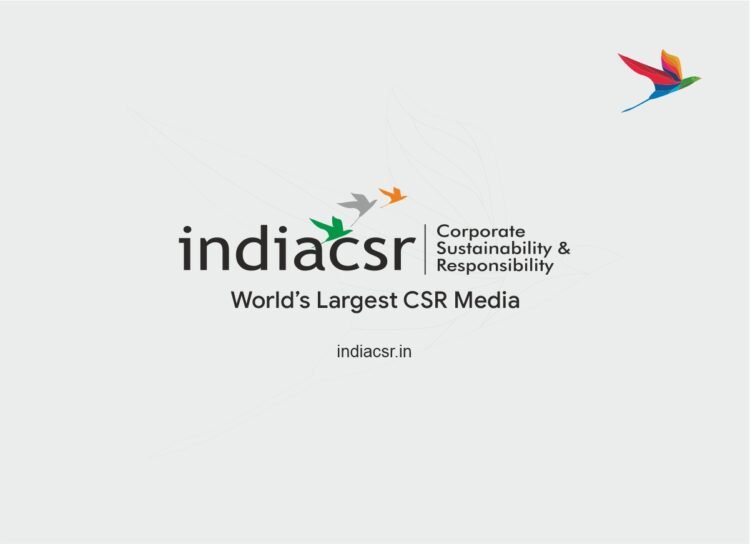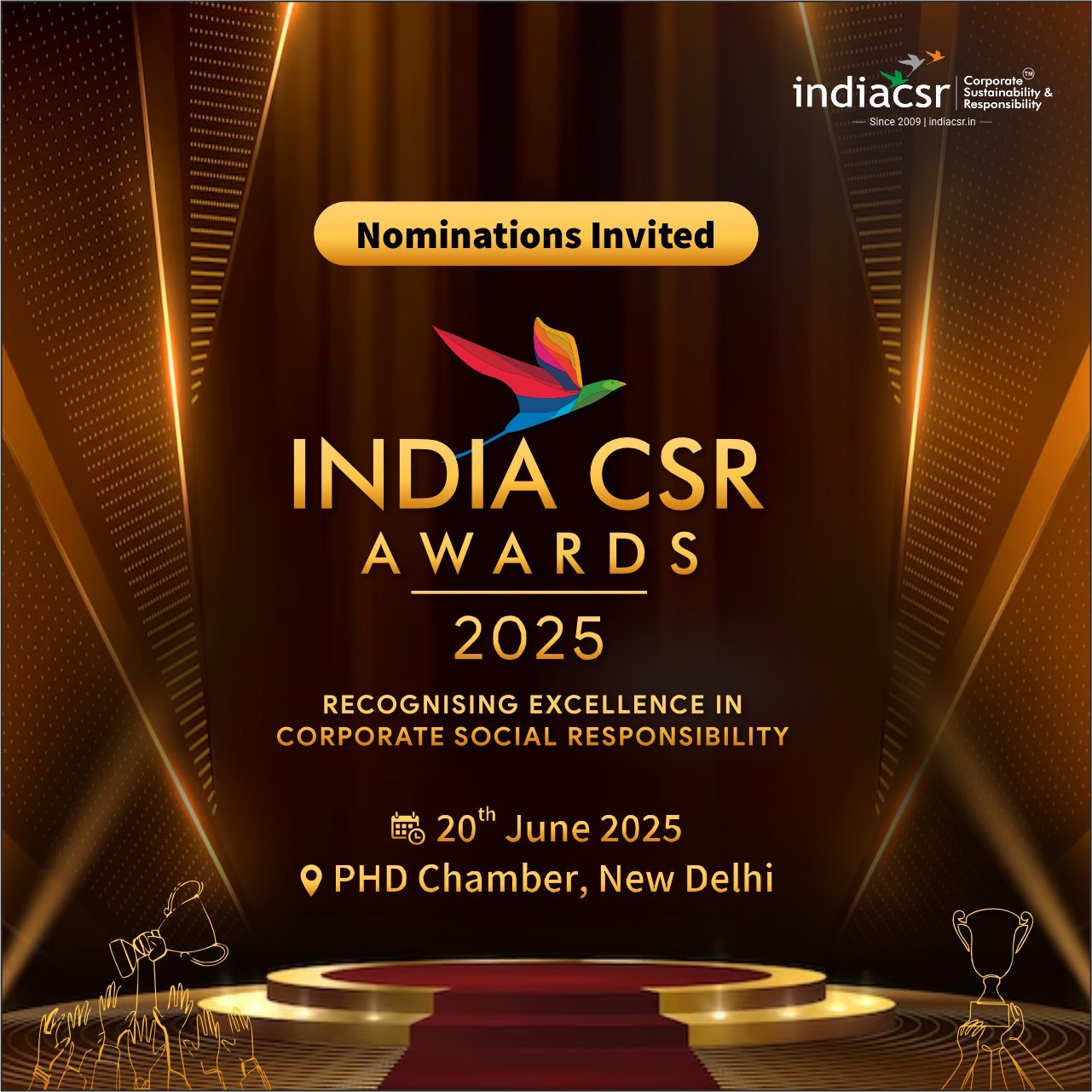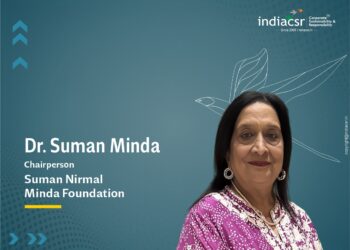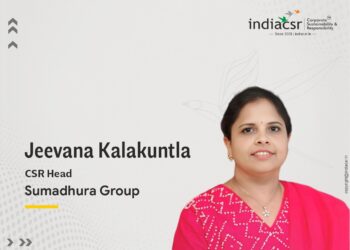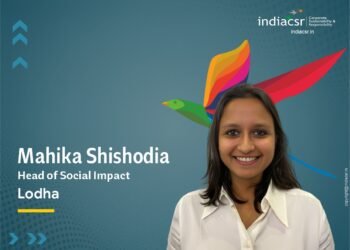JSW group is rendering service in women’s empowerment, skill development, health, education, drinking water, green waste management, economic development and many more areas.

BENGALORE (IndiaCSR): JSW Foundation, a CSR wing of JSW Steel Ltd, largest steel maker in India, has been conferred the India CSR Project of the Year Award [Large Impact] [Jury] for its Mission Against Malnutrition (MAM) eliminating malnutrition among children 0-6 years in Bellary district of Karnataka where the company has production facilities.
In an exclusive interview to India CSR Network Editor Rusen Kumar; Dr. C S Kedar, CEO-JSW Foundation-Bellary shared CSR vision, mission, commitment of the group for the MAM project and its different aspects of his unique CSR project. Edited excerpts:
Tell us something about the unique feature of Mission against Malnutrition (MAM) Project? How does it benefit children?
The Mission Against Malnutrition, MAM in short, blends action-research, evidence based advocacy and administrative capabilities of bringing together multiple partners for a common cause; that is to crystalise innovative way of fighting child malnutrition. We targeted Under-6 year children who are enrolled Anganawadis (Govt. ICDS day-care Centers) and are malnourished.
After series of consultations with CFTRI- Mysuru and other experts coupled with ground level observations between September 2013 and June 2014, the JSW team zeroed in on micro-nutrient deficiency (deficiency of essential minerals and vitamins) in the diet of the ICDS enrolled undernourished children which is making the Home food+ ICDS supplementary nutrition food (SNF) less effective. Therefore, it was conceived that an additional quantity of micro-nutrients in small daily doses would act like catalyst enhancing absorption of regular food intake of children and thereby helping them come out of malnutrition. And the Mission team identified ‘food fortification’ as the route to deliver required micro-nutrients to such children. The team finally zeroed in on Spirulina fortified sugar (SFS) as the answer, as Spirulina has a number of micronutrients. As enunciated by WHO, micronutrients in miniscule quantities work as magic wands in the overall growth of children.
The unique features of the Mission I can list are;
It used Spirulina, a blue-green algae, an ancient cyanobacterium which is a natural food supplement, as micro-nutrient supplement and not any synthetic supplements available in market. It can also be easily cultivated and processed by the local communities. Spirulina is approved as a food supplement by the Food Standards and Safety Authority of India (FSSAI) and categorized as a nutraceutical ingredient. It is low cost and easy to produce, has long shelf life and easy to transport. Importantly, quality standards are prescribed and labs are there to test. National level top research institutions like CFTRI, NIN, NRDC, do speak high about Spirulina.
The MAM approach advocates supplementing and complementing the Home+ICDS food and not a standalone intervention: While Home +ICDS food addresses Protein and Carbohydrate deficiencies, the SFS addresses micro-nutrients deficiencies. The moderately malnourished children were supplemented with 5 grams of SFS per day for 180 days and severely malnourished with 10 grams per day.
Unique Implementation Approach: A culturally deep rooted issue such as child malnutrition cannot be addressed by any one agency; be it Government, NGOs, family, community or anyone for that matter. Therefore the Mission approach brought together the Department of Women & Child Development, Government of Karnataka, CSRs like JSW Foundation and Supraja Foundation, NGOs like Spirulina Foundation, Bhoruka Charitable Trust, Pranati, Charitable Trust For Integrated Development, reputed research institutes like CFTRI, Mysuru, IHMR-Bengaluru, Vijayanagara Institute of Medical Sciences (VIIMS)-Ballari, Department of Social Studies, VSK University and management agency like IID, Bengaluru on board. At times there were 15 different institutions and the local community joined hands for a common cause: evolving an innovative model for fighting malnutrition effectively.
With 30,716 malnourished children (between the age group of 6 months to 6 years) and another 15,000 anemic pregnant women, lactating mothers and adolescent girls being supplemented with Spirulina during pilot Mission phase of 3 years, this is the single largest ‘mission’ against malnutrition conducted globally.
A dramatic reduction in the levels of malnutrition was observed; up to 42% reduction in the number of malnourished children during 2014-16 in Sanduru block and 45.3% reduction in 2016-17 trials in Hosapete and Kudligi blocks. The hypothesis is now being supported by significant data, scientific studies, third party evaluation and clinical research conducted during the phase.
In an independent and non-randomised study conducted by the Institute of Health Management and Research, Bengaluru, of 1000 children, a 46% and 67% reduction in malnutrition was evidenced among children who received 5 and 10 grams of SFS, respectively, as compared to minimal change in the control groups. A significant cognitive improvement and alleviation of biochemical micronutrient deficiency was noted among children who received Spirulina.
Among so many pressing socio-economic issues, what are key observation to go ahead with Malnutrition eradication project?
JSW group is rendering service in women’s empowerment, skill development, health, education, drinking water, green waste management, economic development and many more areas. However, one key factor that motivated and drove us to undertake malnutrition eradication project is JSW’s desire to develop a workable innovative model to fight child malnutrition effectively and dedicate to the nation.
The World Bank describes the issue of child malnutrition in India as the ‘India’s Silent Emergency’. Driven by a deeper concern, Smt Sangita Jindal, Chairperson, JSW Foundation, strongly felt that “Nutrition should be a birth-right of every Indian child”.
Extract from the budget speech of GOI on 10TH JULY 2014 underlines the fact that, “A National Programme in mission mode is urgently required to halt the deteriorating malnutrition situation in India as present interventions are not adequate. A comprehensive strategy including detailed methodology, costing, timelines and monitorable targets need to be put in place …”
All these indicated an urgent need for an innovative and appropriate approach & strategies and thus JSW group decided to adopt fighting child malnutrition as one of their main corporate social responsibilities.
How did JSW Steel partner with the Government of Karnataka on MAM project?
Being an IAS Officer, I have had 34 years of work experience in public administration before joining JSW Foundation. As soon we completed our field analysis and zeroed in on Spirulina supplementation as our innovative approach for addressing micro-nutrient deficiency among malnourished children who are in Anganawadies, I realized that without partnering with the State Government we ought not to undertake such a path breaking pilot initiative. Therefore, we approached the Department of Women & Child Development (DWCD), Government of Karnataka. We agreed that while DWCD will be the host partners, JSW provides required funding support and the MAM team will provide technical knowhow. Accordingly, on 28.2.2014 a formal Agreement was made between the Government and JSW prior to the launch of the Mission in June 2014.
Personally I believe, any such idea or pilot initiative which has the potentiality to grow into a national model should always be initiated in partnership with the Government. While it is a matter of taking the Government into confidence, it can also help in scaling up subsequently. I think, no development is complete unless the involvement and engagement of the Government is ensured.
Implementation is always a challenge for larger project. Our readers are keen to know about key challenges that you face?
Yes, indeed, implementation of large project is challenging from project management perspective. It is more so if it is a pilot where strategies and actions are evolving in a Mission mode, where things have also to be delivered in a time-bond frame. And finally, the challenge will become much bigger if you are trying to address an issue that is socio-culturally and socio-economically deep rooted.
I attribute the success to three aspects; One, as I have already told, the MAM project adopted a unique multi-partner and multi-level approach which was centric to making the best use of institutional strengths and expertise. Therefore, although 15 institutional partners worked together, they played their role within their competencies.
Second, the project made best use of the Government institutional resources such as Anganawadi workers, ICDS infrastructure, PRIs.
And finally, the project explored the expertise and commitment of local youth, both girls and boys’ as Paustika Mithras in rolling out the Mission activities. This made the Mission a smooth sailing through the tough local conditions.
How, according to you will such large project help eradicating poverty in the area?
Although MAM does not aim at eradicating poverty per se, still aiming at addressing malnourished children and helping them to overcome undernourished state, a healthy child will take a re-birth in the family. And because the child is no longer undernourished, its growth and development is expected to be normal and become a healthy citizen, enabling society harvest demographic dividend.
How your ‘Mission against Malnutrition’ is complementing the Govt. on Malnutrition?
As I have already told, the MAM approach advocates supplementing and complementing the Home+ICDS food and not as a standalone intervention: While Home +ICDS food was geared towards addressing Protein and Carbohydrate deficiencies, the SFS addresses micro-nutrients deficiencies. Thus the effort was to make the children food more ‘complete’. Another thing one should notice; the target group of the Government in the fight against child malnutrition and that of the MAM project are same, under 6 children, pregnant women and lactating mothers.
What kind of feedback have you got from various stakeholders?
Very encouraging!! On one of my field visit to village Joga in Sanduru taluka, Shivarudramma, mother of Baby Vijaya Shree (age two year), met me. In our conversation she expressed “Earlier, my daughter had health problems. She used to be very cranky, ate less and didn’t sleep well. For the past 3 months we are giving her Spirulina. She has shown significant weight gain. Now she has become healthy, alert, active, her appetite has improved and she sleeps well.”
The Mission has supported 30,713 undernourished children like baby Vijaya Shree in three blocks of Ballari district during these three year pilot period.
Uma, an Anganawadi worker at Village Basapur expressed once “There is a considerable reduction in the number of children belonging to Red and Yellow categories after JSW started providing Spirulina. Now we are not able to easily find Red and Yellow Zone kids as before.” She was referring Red to severely malnourished children and Yellow to moderately malnourished.
The Mission has worked with the 1,034 Anganawadi workers like Uma. Vijayalakshmi, mother of two daughters, resident of the same Basapur village expressed,“During my first pregnancy, I had not taken Spirulina capsules. It was not available then in our village. And, during my second pregnancy I took Spirulina on advise of Paustika Mithras. I had normal delivery. Baby was healthy and had normal birth weight. When compared to my elder daughter my younger daughter is very active, healthy and has good appetite”.
The Mission has supplemented diet of 4,782 pregnant women and 10,116 lactating mothers like Vijayalakshmi during the pilot phase. These community voices are the biggest reward to me. Women have expressed at different times that they are even willing to buy Spirulina now and support their children if made available at reasonable price.
Madhusudhan, CDPO of Sanduru taluka expressed” We do provide quality food to children in Anganawadies which supplement daily needs of carbohydrates, protein and fat. But micro-nutrients were missing. I think Spirulina is meeting this gap”. B.S.Kaladgi, Deputy Director – DWCD, Ballari said “giving Spirulina to children, pregnant women and lactating mothers is benefiting them”. The CEO of Zilla Panchayath said” The pilot Mission in 239 Anganawadies of Sanduru, covering 6700 children, has brought promising results on board”. “The preliminary results of the pilot intervention in Ballari are fantastic and encouraging. Now that the Government of India officials have already visited the project area the model is gaining due attention. May the model become a national pilot model. We are happy to be partners in the process!” said the Additional Chief Secretary to the Government of Karnataka, Department of Women and Child Development.
PADMASHREE DR H. SUDARSHAN, a Right Livelihood Awardee (Alternate Nobel Prize) and a former member of WHO Group on Health, National Nutrition Mission, and National Commission on Population while delivering his talk in a CFTRI, Mysuru, organized two-day National Conference on Malnutrition: Challenges, Success Stories and Way forward on March 3-4, 2017 said, “…having worked very closely with the National Nutrition Mission and the National Health Mission, I am happy to say that this Mission is one of the most commendable works and I totally support it. Spirulina should be made popular by calling it as “Hanuman sanjeevani”. Once again I would like to congratulate Dr.C S Kedar and his team for this excellent innovation which is most amazing; may be next to ORT. I will put it as the second most important appropriate technology targeting the poor”
Kindly highlight the impact of the project – both outreach numbers and scientific validation, so far?
Improved Growth & Development: During June 2014 when the pilot Mission was launched in Sanduru block of Ballari district in Karnataka State, as per Government Departmental report, the rate of malnourished children among ICDS enrolled children in the block was 45.6%. And by June 2016, (the end of the Sanduru pilot) it got reduced to 26%, a record drop of 43% during these two years. Whereas the same for the previous two year (June 2012-14 was just 1.1% drop). Parallel to this regular Departmental monitoring, the Mission team also tracked one third of the children targeted under pilot from start month to end of 6th month and noted that 42% children come out of malnutrition state. The same for Hosapete -Kudligi pilot (the adjacent blocks of Sanduru) during 2016-17, the drop observed to 45.3%.
Institute of Health Management & Research (IHMR), Bengaluru, an internationally well known research agency, undertook an independent study which showed substantial reduction in under-weight prevalence; up to 67% with 10 gms and up to 46% with 5 gms of SFS Supplementation. The study also observed significant improvements in biochemical levels of iron, vitamin A, hemoglobin as well as immunity and also noticeable progress in cognitive development of those children.
Sustained health improvement of targeted children: Vijayanagara Institute of Medical Sciences (VIMS), Ballari, conducted third party evaluation 6 months post the mission intervention and they reported that 24% of children being still normal indicating the sustainability of outcomes.
Socio-cultural acceptance: Vijayanagara Shri Krishnadevaraya University (VSKU) carried out a study on the socio-cultural impact of the Mission. Their findings reveal that the Mission has impacted the community very deeply with regard to malnutrition and there is a wide acceptance of SFS supplementation. And also acceptable to children
Do you have any road map for the project sustainability for future endeavors?
Yes. The first 3 year pilot phase of the Mission during 2014-17 has demonstrated successfully that this multi micronutrient fortification approach with Spirulina fortified sugar is cost effective, swift in impact and efficient in scaling up as it is easy to produce, store, transport and deliver effectively even in remote areas. Therefore, I think it offers a promising solution to deliver micro-nutrients effectively to the needy children across the country and thus significantly lessening the burden of malnutrition in the country.
Therefore, JSW’s Mission team started advocating the GOI and various State/UT Government, “Provide Spirulina fortified sugar (SFS) to all the children in Anganawadis (ICDS Centres) across the country @ 2.5grams (1/2 tea spoon) per day to normal children, 5 grams (1 spoon) to moderately malnourished and 10 grams (2 spoons) to severely malnourished children for 300 days in a year during their entire period of association with ICDS programme”.
If we are successful in our advocacy efforts, the sustainability of the intervention is ensured.
In this regard, we realized that now it is critical to create and demonstrate a district working model successfully. This demands some important process innovations such as how Spirulina can be cultivated and SFS done by local people, preferably, women groups, how respective district administrations can take lead role in driving the Mission in their respective districts and how the district administration can involve and engage other key stake-holders such as elected representatives, Panchayat Raj Institutions (PRI’s), media, judiciary and civic society in this fight against malnutrition effectively.
The Mission team believes that making the district administration use information technology (IT) solutions in monitoring the Mission Against Malnutrition activities such as identifying right beneficiaries, efficient supply chain management, effective monitoring of growth & development of each of the targeted malnourished children, anemic pregnant women and lactating mother is what holds key to the success in the long run.
We would like to focus on these areas of process innovation and simultaneously intensify our advocacy efforts with State & Central Governments, and other corporates groups.
You may also like:
- We strive to make a positive impact on the society and environment: Kazutada Kobayashi, President & CEO, Canon India
- Our Core Values Drive Sustainability Across Our Business and Serve: Manoj Kumar Singh, Chief of Regulatory Affairs, Sustainability & CSR, Industowers
- Samsung Smart Class Aims to Bridge the Digital Gap Between Rural and Urban, Says Deepak Bhardwaj, Vice President, Samsung India
- CSR Interview with Dr. CS Kedar, Ratan Somani, Vikas Sharma
- Change Comes With Collaboration at Vedanta Nand Ghar: Ritu Jhingon, Project Head
📢 Partner with India CSR
Are you looking to publish high-quality blogs or insert relevant backlinks on a leading CSR and sustainability platform? India CSR welcomes business and corporate partnership proposals for guest posting, sponsored content, and contextual link insertions in existing or new articles. Reach our highly engaged audience of business leaders, CSR professionals, NGOs, and policy influencers.
📩 Contact us at: biz@indiacsr.in
🌐 Visit: www.indiacsr.in
Let’s collaborate to amplify your brand’s impact in the CSR and ESG ecosystem.


